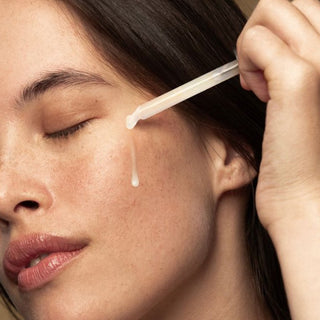When we talk about skin hydration, most people think of Hyaluronic Acid (HA). It’s everywhere—from moisturizers to serums to sheet masks. But here’s the thing: hydration isn’t about a single trending ingredient. It’s about understanding a full category of ingredients called humectants—and choosing the ones that work best for your skin type and barrier.
In this blog, we’ll compare four of the most popular humectants in skincare:
First, What are Humectants?
Humectants are ingredients that attract water into the skin. Think of them as magnets for moisture.
They’re used in moisturizers, serums, and even cleansers to help prevent dryness and maintain skin barrier health.
Here are four of the most popular humectants in skincare:
- Hyaluronic Acid
- Glycerin
- Urea
- Panthenol (Vitamin B5)
Now let’s compare them.
What is Hyaluronic Acid?
Hyaluronic Acid is a sugar molecule that naturally exists in the skin, joints, and connective tissue. It’s best known for its ability to hold up to 1,000 times its weight in water, making it sound like the ultimate hydration hero.

But here’s the reality:
- Topical HA has a large molecular size, which means it sits on the surface and doesn’t penetrate the skin.
- Hydrolyzed (smaller) HA versions may go a bit deeper—but are more likely to cause irritation or sensitivity.
- In dry weather, HA can actually pull water out of your skin if there’s no humidity in the air.
So yes, HA can hydrate the skin on the surface, giving it a plump, smooth look—but the effect is temporary. It doesn’t repair the barrier or offer lasting hydration unless paired with other ingredients.
👉 For more on HA’s limits, read: Why Hyaluronic Acid Hasn’t Been On Our Radar
We personally prefer humectants like glycerin and urea that are significantly more cost effective and also have small molecules that are easily absorbed through the skin to allow for significantly longer lasting skin hydration.
Glycerin: The Gold Standard Humectant
Glycerin (also called glycerol) is one of the oldest and most reliable humectants in skincare. It occurs naturally in the skin and works beautifully across all skin types.

Benefits of Glycerin:
- Deep hydration: Draws water from both the air and inner skin layers
- Barrier protection: Helps strengthen the skin’s outer layer
- Soothing & healing: Reduces flakiness, helps repair micro-tears
- Non-irritating: Safe even at high concentrations
- Affordable & effective: Cost-efficient without sacrificing results
Glycerin stays active in the skin longer than HA, hydrates deeper, and works well in both humid and dry climates—making it one of the best all-rounders.
Does it darken skin?
No. Glycerin does not cause skin darkening. In fact, by keeping the skin hydrated and healthy, it can improve overall tone and texture over time.
Urea: The Hydrator + Gentle Exfoliator
Urea is another natural component of the skin’s natural moisturizing factor (NMF). It not only attracts water but also gently exfoliates the skin—making it unique among humectants.

Benefits of Urea:
- Hydration: Deeply moisturizes dry, rough skin
- Exfoliation: Removes dead skin cells and improves texture
- Soothing: Helps with eczema, psoriasis, and ichthyosis
- Improves delivery: Boosts absorption of other actives
- Anti-fungal & anti-bacterial: Helps with acne and fungal acne
As we age, our natural urea levels drop. That’s why topical urea creams, like our AccuHydra Hydrating Gel Cream or Carbamide Intensive Hydration Cream, help rebuild lost hydration and treat persistent dryness.
Panthenol: Healing Hydration for Sensitive Skin
Panthenol (also known as provitamin B5) is a humectant and emollient. It’s ideal for skin that’s sensitive, damaged, or irritated.
Benefits of Panthenol:
- Hydrating: Attracts and retains moisture
- Healing: Helps repair wounds, inflammation, and irritation
- Barrier strengthening: Enhances resilience against environmental stress
- Calming: Reduces redness and itchiness
We use panthenol in our Niacinamide Serum and Crème B3-B5-E because it works beautifully with niacinamide to deliver both barrier repair and hydration in one formula.
Other Humectants in Skincare
Sorbitol
Sorbitol is a sugar alcohol that occurs naturally in fruits and plants. It functions similarly to glycerin, attracting moisture to the skin and enhancing hydration. Sorbitol is often found in cleansers and moisturizers.
Sodium PCA
Sodium PCA (pyrrolidone carboxylic acid) is a naturally occurring humectant derived from amino acids. It is highly effective in attracting and retaining moisture, making it a popular ingredient in many hydrating skincare products.
Comparing Hyaluronic Acid, Glycerin, Urea and Panthenol
| Ingredient | Hydrates | Soothes | Repairs Barrier | Exfoliates | Long-Term Results |
|
Hyaluronic Acid |
✅ | ❌ | ❌ | ❌ | ⚠️ Surface-level only |
| Glycerin | ✅✅ | ✅ | ✅ | ❌ | ✅✅ |
| Urea | ✅✅ | ✅ | ✅ | ✅ | ✅✅ |
| Panthenol | ✅✅ | ✅✅ | ✅✅ | ❌ | ✅✅ |
Here’s a quick summary of the best use cases for each one of the 4 humectants discussed above:
- Hyaluronic Acid: Best for temporarily plumping the skin.
- Glycerin: Excellent for basic hydration and barrier protection, gentle for all skin types.
- Urea: Ideal for dry, rough skin and conditions like eczema; also mildly exfoliates.
- Panthenol: Great for soothing, healing, and hydrating sensitive or irritated skin.
Conclusion
When it comes to skin hydration, humectants play crucial roles in maintaining moisture levels and improving skin health. By exploring and experimenting with these humectants, you can find the perfect combination that works best for your skin, ensuring a hydrated, glowing complexion all year round.

